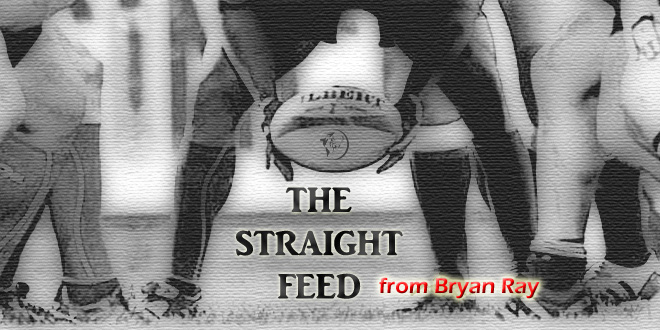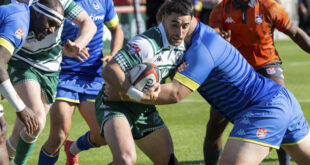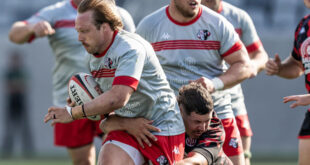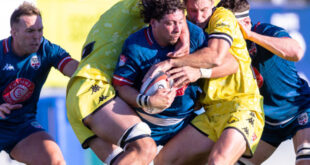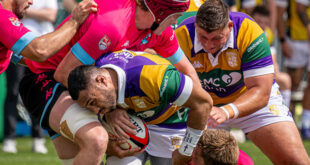It was not a great weekend for Canadian rugby. Losses were taken on all fronts – the men’s and women’s 7s, and the women’s Maple Leafs XVs. The scorelines only tell part of the story, it’s the performances themselves that we need to talk about.
GREEN MAPLE LEAFS
The Maple Leafs lost two matches in a row against England Academy, basically ‘A’ internationals, but actually have done reasonably well. In both they were leading well into the final quarter, conceding late tries to lose. That suggests three things – we’re a bit tactically naive, lacking elite level fitness, and our bench wasn’t as strong as England’s. None are a surprise, or even particularly alarming.
These kinds of tours are about exposing the next layer of talent to international rugby. Inevitably some players make the grade and others aren’t quite up to it, or not yet anyway. Keep in mind that Katie Svoboda and Gabrielle Senft were playing with the u20s this summer, and a few players were in new positions. Second row Janai Haupapa has been playing centre back home. The tour suggests that there is talent coming through, it just needs fine tuning and most of all more exposure to better games. Where have we heard that before?
NO LOVE FOR WOMEN
Meanwhile in Dubai the senior women 7s had 17-year-old Caroline Crossley and NCAA basketball convert Megan Lukan on the roster. These are long-term project players who will grow rapidly with each opportunity they get. Sadly the next tournament isn’t until the end of February, a frankly deplorable situation especially in an Olympic year. World Rugby meekly announced that Clermont would step in as the 5th stop on the circuit, but why on earth is there less stops than a year ago? Women’s rugby is on a major upswing and the suits are dropping the ball.
On the field Canada had a poor start against Fiji (more of that later…). It could be that they were caught by surprise – we all were – but it’s no excuse. They redeemed themselves and played reasonably well the rest of the way out. Some tough calls against England didn’t help, and there’s no shame in losing to New Zealand in extra time. There were mistakes made, but the good far outweighed the bad.
DEBACLE IN DUBAI
Sadly the same can’t be said about the men. They were way, way off the pace. It wasn’t so much that they lost – we can stomach that – it’s the how that’s most distressing.
Liam Middleton’s assessment post-tournament was that it was a “multi-faceted issue” and mostly blamed it on not recovering from the shocking opener against Fiji. The Islanders are champions for a reason, but they are not invincible super-humans (Pio Tuwai aside). Players were falling off tackles like teflon and ball retention was virtually non-existent.
The worrying thing is that it stayed that way for the the best part of the next three games as well. They won the final two and the Shield with it, but you could tell from the long faces how excited they were. Phil Mack and Nathan Hirayama didn’t even stick around long enough for the picture.
The players let themselves down, there’s no way around that, but the management also has to shoulder some of the blame. Canada’s attack was stagnant with virtually no ideas outside of passing the ball from one side to the other. Only Conor Trainor seemed to deviate from the script, the only player with any kind of x-factor, and he was lost to a shoulder injury.
The lack of pace in the side is another serious problem, especially when the fastest player on the team (Justin Douglas) spends more time on the bench than on the field. Where can we find a Carlin Baker?
Cape Town is only days away and Vancouver three months. Several individuals could (should) be playing for their spots this weekend, and the staff is not necessarily exempt. If changes need to be made, the deadline is Wellington on January 30.
SEVEN > FIFTEEN
One issue Middleton does will not have to deal with this season is a tug-of-war between 7s and XVs. Patrick Johnston alluded to it in his piece on Friday, and multiple sources have now confirmed that core 7s players will no longer be doing double duty. While this new policy has not been written in stone, ARN understands that the 7s program will have first call on the 20 carded athletes, meaning the likes of John Moonlight and Nathan Hirayama will play no part in the upcoming ARC.
This might hamper selections in the short term, but it’s become blindingly obvious that the mix-and-match practice that has been going on for the past several years does not work. It has been a massive hindrance to the XVs program, and the past two years suggest that player burnout has affected the 7s team as well. No word yet on whether this will extend past the Olympics, but it should.
The main issue of course is who plays what. Young players with potential to go either way will need guidance, and one hopes that common sense prevails and the likes of Andrew Coe and Matt Mullins are shepherded towards professional XVs careers, where their future undoubtedly lies.
AMERICAS RUGBY CUP-ER-SHIP
So if those players are unavailable to Kieran Crowley for the ARC who is? Precisely who might be picked is going to need a full article on its own, but others who won’t be are the majority of Canada’s European professionals. There might be a couple here of there who aren’t required by their clubs – for example Phil Mackenzie was released for the Pacific Challenge in March – but by and large the top exports are out.
The new tournament coincides with the Six Nations, which means it falls in the international release window, but the simple fact is North American players are largely signed to top club sides with the understanding that they will be available when their test stars are away on national duty. No Canadian player will have a release written in their contract as of yet, though that may be an option in the future.
While clubs are obliged under Regulation 9 to release their players to international sides, it’s in Rugby Canada’s best interests to maintain good working relationships with the clubs to ensure not only that players are available for more important games like the Pacific Nations or November tours, but also to maintain the market value for Canadian players. North Americans without access to European passports are classed as imports. Where Pacific Islanders and South Africans fall under the Kolpak ruling – a ridiculous situation – and thus exempt from employment restrictions, Canadians instead are treated under the same umbrella as New Zealanders. You can see the inherent problems.
By the way, it’s recently been brought to our attention that the tournament is now officially the Americas Rugby Championship. Apparently there were commercial rights issues on ‘Americas Rugby Cup’, so here we are. You would think the powers-the-be might have done their homework before making promotional posters. C’est la vie.
 Americas Rugby News Rugby news from across the Americas!
Americas Rugby News Rugby news from across the Americas!
